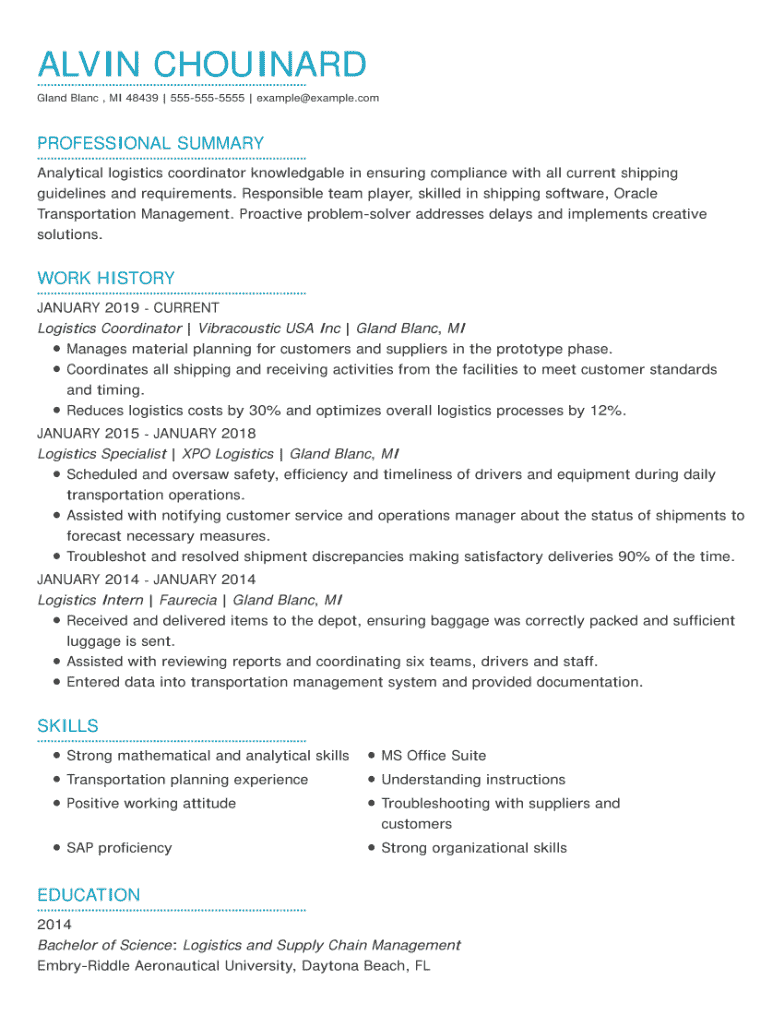Logistics CV examples and CV writing tips
Logistics is a job industry centred around getting a product to and from a location. How do you write a CV showcasing that?
Logistics is a job industry centred around getting a product to and from a location. How do you write a CV showcasing that?





OUR USERS HAVE BEEN HIRED BY

Logistics is the process of organising and implementing product management and delivery. If that sounds like quite a general term, that’s because it is. It refers to any management of the flow of products — transferring products from the makers to the warehouse, from the warehouse to the retail location, and from the retail location to the customer’s home. If you’re looking to create a logistics specialist CV, here’s what you need to know.
Here are a few jobs that indicate that you’re part of the logistics industry:
Generally, if you are in any way involved in moving inventory from one place to another, you’re probably part of the logistics industry. A logistics CV sample can help guide you on how to best feature your skills and qualifications for these jobs.
The actual structure of your logistics CV will partially depend on your CV format. Depending on which format you use, you might want to adjust your CV this structure to highlight different sections. However, the sections themselves will typically remain the same.
The first major section in your CV will be the professional summary or career objective. A career objective is a two to three-sentence paragraph that goes over the most important elements from every section, including your best achievements, key skills and years of experience. Essentially, these would be the sentences you would offer if you could only give the hiring manager three sentences.
Your skills section should include skills you have that fit the job description. Here are a few bullet points a professional logistics CV will often list:
You will see both soft skills and hard skills on logistics CVs. These are both important: a recruiter wants to know you have the talent to do the technical tasks they’re hiring you for as well as the ability to collaborate with team members and handle clients.
Your work experience section is a big part of showing recruiters your competencies. Include all previous jobs you’ve had in the industry. You can also include work experience that isn’t directly in the logistics industry but is tangentially related to it, like a warehouse worker or a general manager.
Your education section may vary depending on what position you choose. An entry-level logistics expert typically needs a bachelor’s degree. A Master of Business Administration would likely qualify you for most logistics job positions.
You can also include any certifications and awards that prove your skills. The CSCP certification from APICS, for example, is a common supply chain certification now available in the UK, along with Certified in Production and Inventory Management (CPIM).
If you’re looking for CV templates to base your logistics CV on, look no further than the logistics CV examples at CVHelp. You can find hundreds of CVs in different logistics job titles, making it easier than ever for you to create a CV that looks great. From there, you can use the CV builder tool to improve your CV writing.
Yes. Your logistics CV should include a cover letter to put you ahead of the other job seekers and give more details about your strengths and career achievements. Additionally, the cover letter is your chance to ask for a job interview. For expert advice to help you write your cover letter, use the CVHelp cover letter builder.
Often, you can find a logistics job without direct experience. However, because a bachelor’s degree is almost always necessary, you can cite this as relevant experience as well. If a job states, “two years of experience required,” you may have those two years of experience in the field due to projects you were working on during school. Related volunteer activities and internships can also help here.
Yes. Making use of keywords is a great way to personalise your CV for each job posting. Scan through the job posting, look for specific skills and requirements the recruiter lists, and use these keywords in your CV. It’s a great way to create a CV that reflects exactly what a recruiter wants.
We personalize your experience.
We use cookies in our website to ensure we give you the best experience, get to know our users and deliver better marketing. For this purpose, we may share the information collected with third parties. By clicking “Allow cookies” you give us your consent to use all cookies. If you prefer to manage your cookies click on the “Manage cookies” link below.